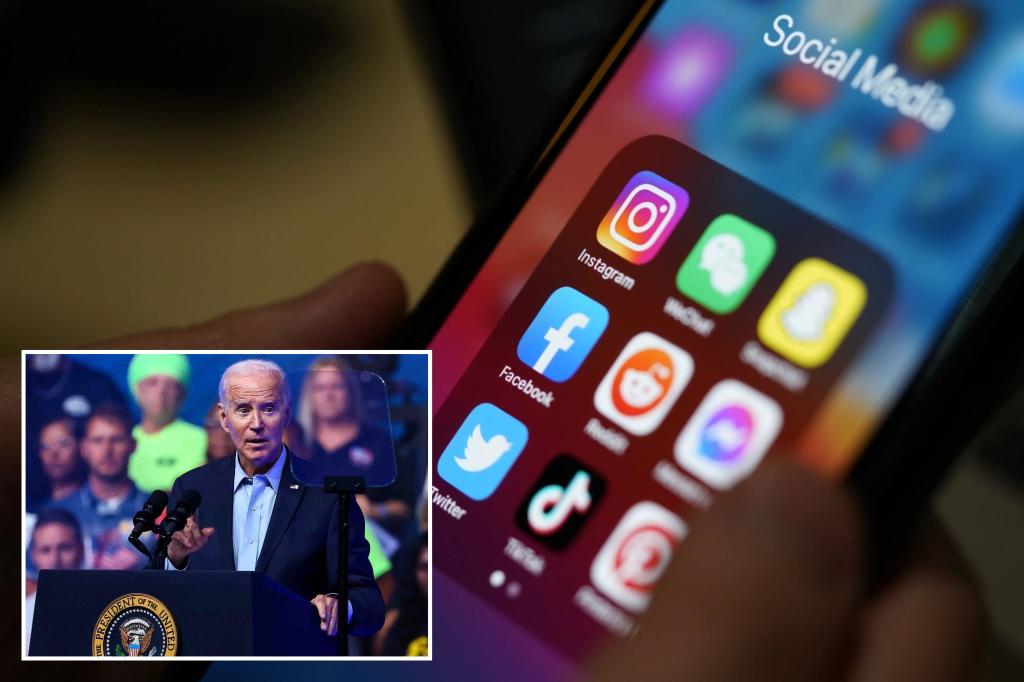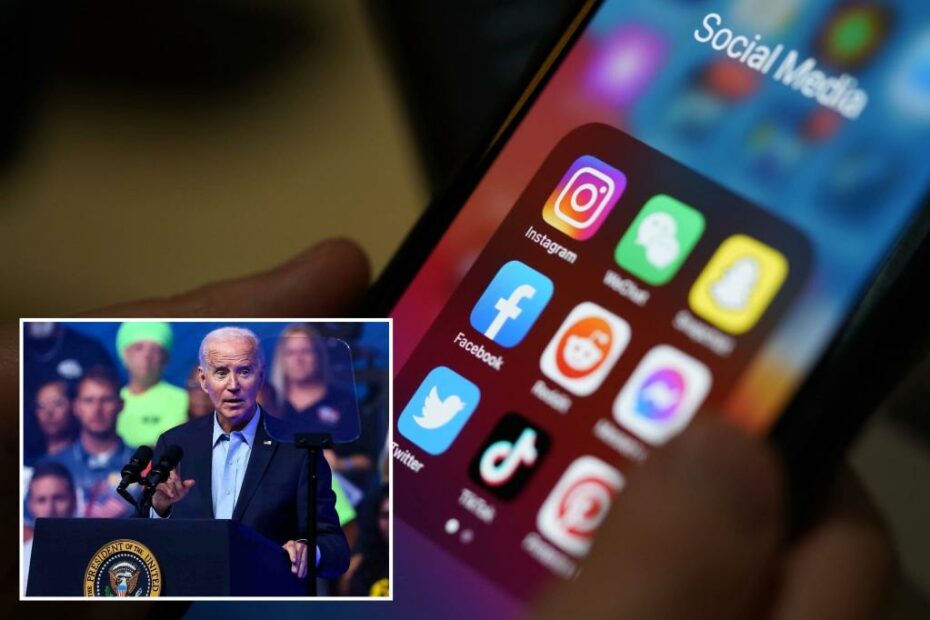Judge to decide if US gov wrongly censored social media users
Federal Judge to Decide Whether Biden Admin Violated First Amendment by Censoring Social Media Users
A federal judge will soon determine whether the Biden administration’s actions regarding social media censorship violated the First Amendment. Last year, the Republican attorneys general of Missouri and Louisiana brought a lawsuit alleging that the administration fostered a “federal censorship enterprise” that pressured social media platforms to silence dissenting views on topics such as COVID and election security.
The case, presided over by Louisiana judge Terry A. Doughty, a former appointee of President Trump, will examine the communications between the US government and major social media sites like Facebook, Twitter, YouTube, Instagram, and LinkedIn. The judge’s ruling will impact the preliminary injunction sought by Missouri and Louisiana, which aims to prevent federal officials from pressuring social media platforms to censor certain users and viewpoints.
In March, Judge Doughty refused to dismiss the suit, deeming the free speech claims credible enough to move forward. This case is considered one of the most significant First Amendment battles currently before the courts, as it tests the limits of government control over social media content.
Missouri and Louisiana claim that social media platforms violated the First Amendment by excessively censoring users on topics like COVID and election security. However, the Department of Justice argues that the bans were necessary for public health and safety.
As part of the litigation, the judge allowed the plaintiffs to gather evidence, including emails exchanged between White House officials and social media company leadership. Government officials were also deposed, with high-ranking figures like Dr. Anthony Fauci, the face of America’s pandemic response, being questioned.
According to the plaintiffs, the Federal Bureau of Investigation, the State Department’s Global Engagement Center, and the Department of Homeland Security’s Cybersecurity and Infrastructure Security Agency colluded with social media platforms in multiple meetings to flag and censor First Amendment-protected speech perceived as misinformation.
The lawsuit cites various emails sent between the White House and social media executives, including one from the White House’s former director of digital strategy, Rob Flaherty, accusing YouTube of promoting vaccine hesitancy. Since President Biden took office, former President Trump, anti-vaxxer Robert F. Kennedy Jr., and Republican congresswoman Marjorie Taylor Greene have all had their social media accounts banned.
The Justice Department has filed a nearly 300-page brief denying the allegations and arguing that the actions taken were necessary to protect public health, safety, and security during the COVID-19 pandemic and in the face of foreign assaults on election infrastructure.
This lawsuit follows the suspension of several prominent politicians’ social media accounts. Former President Trump was banned from Twitter following the Capitol riot in January 2021, with the platform citing the risk of inciting further violence. Elon Musk recently reinstated Trump’s account after purchasing the platform in October last year. Anti-vaxxer Robert F. Kennedy Jr. had his account removed from Instagram in 2021 for repeatedly sharing debunked claims about the coronavirus and vaccines. Republican congresswoman Marjorie Taylor Greene’s Twitter account was also suspended for allegedly violating COVID-19 misinformation policies.
Other individuals, such as medical activists, independent journalists, and conservative commentators who have experienced censorship on social media, have also filed complaints. However, many of these lawsuits have been dismissed due to insufficient evidence that social media companies were acting at the government’s behest.
The Missouri v. Biden suit goes beyond the issue of censorship, claiming to protect the rights of their citizens as listeners, readers, and audiences of social media speech.
FAQs:
1. What is the lawsuit against the Biden administration about?
– The lawsuit alleges that the Biden administration engaged in a “federal censorship enterprise” that pressured social media platforms to censor dissenting views on topics like COVID and election security.
2. Who brought the lawsuit?
– The Republican attorneys general of Missouri and Louisiana brought the lawsuit.
3. What is the judge’s role in the case?
– Louisiana judge Terry A. Doughty, a former appointee of President Trump, is presiding over the case and will decide whether the Biden administration’s actions violated the First Amendment.
4. Which social media platforms are involved in the case?
– The judge is considering communications between the US government and major social media sites like Facebook, Twitter, YouTube, Instagram, and LinkedIn.
5. What is the potential impact of the judge’s ruling?
– The ruling will affect the preliminary injunction sought by Missouri and Louisiana, which aims to prevent federal officials from pressuring social media platforms to censor certain users and viewpoints.
6. Why does the Department of Justice argue that the bans were necessary?
– The Department of Justice claims that the bans were necessary for public health and safety, particularly during the COVID-19 pandemic.
7. Which individuals have had their social media accounts banned?
– Former President Trump, anti-vaxxer Robert F. Kennedy Jr., and Republican congresswoman Marjorie Taylor Greene are among those who have had their social media accounts banned.
8. What is the Justice Department’s response to the allegations?
– The Justice Department has filed a nearly 300-page brief denying the allegations and arguing that the actions taken were necessary to protect public health, safety, and security.
9. Have other lawsuits regarding social media censorship been successful?
– Many lawsuits regarding social media censorship have been dismissed due to insufficient evidence that social media companies were acting at the government’s behest.
10. What is the aim of the Missouri v. Biden suit?
– The lawsuit aims to protect the rights of citizens as listeners, readers, and audiences of social media speech, going beyond the issue of censorship.

Judge to Determine Whether US Government Unjustifiably Restricted Social Media Users
Federal Judge to Decide Whether Biden Administration Violated First Amendment by Censoring Social Media Users
A federal judge will soon determine whether President Joe Biden’s administration violated the First Amendment by censoring users on social media platforms over topics like COVID-19 and election security. The lawsuit was brought forward by Republican attorneys general of Missouri and Louisiana last year, alleging that the Biden administration had created a widespread “federal censorship enterprise” that pressured social media platforms to remove dissenting views, including criticism of mask mandates and objections to COVID-19 vaccination.
The judge presiding over the case, Terry A. Doughty, a former President Trump appointee from Louisiana, is currently considering whether to intervene in the communication between the US government and major social media sites such as Instagram, Twitter, Facebook, YouTube, and LinkedIn. According to court documents, Doughty’s ruling will impact the state of Missouri and Louisiana’s preliminary injunction, which aims to halt federal officials from pressuring social media platforms to censor users, content, and viewpoints they dislike.
The lawsuit is seen as one of the most significant First Amendment battles awaiting resolution in the courts, as it tests the boundaries of government oversight of social media content. Missouri and Louisiana argue that social media sites have violated the First Amendment by excessively censoring users on topics related to COVID-19 and election security. However, the Department of Justice (DOJ) claims that the bans were necessary for public health and safety.
Doughty’s ruling will also affect whether plaintiffs from Missouri and Louisiana will be allowed to gather evidence, including emails between White House officials and social media leaders. These plaintiffs have been granted permission to depose high-ranking government officials, such as Dr. Anthony Fauci, who has played a prominent role in America’s response to the pandemic.
The lawsuit alleges that the Federal Bureau of Investigation, the State Department’s Global Engagement Center, and the Department of Homeland Security’s Cybersecurity and Infrastructure Security Agency colluded with social media platforms in numerous meetings about misinformation. The parties involved systematically flagged a significant amount of First Amendment-protected speech to platforms for censorship. The plaintiffs have provided various emails exchanged between the White House and social media executives as evidence.
The DOJ has filed a lengthy brief denying the allegations, claiming that the federal government’s actions were necessary to protect public health, safety, and security during the pandemic and attacks on election infrastructure. The department argues that approving the injunction proposed by Missouri and Louisiana would impede the government’s ability to combat foreign influence campaigns, prosecute crimes, safeguard national security, and provide accurate information on matters of public concern, such as healthcare and election integrity.
The lawsuit was prompted by the suspension of several high-profile politicians’ social media accounts. Former President Donald Trump was banned from Twitter following the Capitol riot on January 6, 2021, with the platform citing the risk of further incitement of violence. Elon Musk reinstated Trump’s account after purchasing the social media platform in October of the same year. Anti-vaxxer Robert F. Kennedy Jr. also had his Instagram account suspended in 2021 for repeatedly sharing debunked claims about the coronavirus and vaccines. Republican congresswoman Marjorie Taylor Greene’s Twitter account was suspended in March for allegedly violating the platform’s COVID-19 misinformation policy.
Apart from allegations of censorship, the Missouri v. Biden lawsuit demonstrates a particular interest in protecting and upholding the rights of citizens who consume social media speech. Several medical activists, independent journalists, and conservative commentators who have been censored by popular social media platforms have also filed complaints. However, many of these lawsuits have been dismissed due to insufficient evidence linking social media companies to government interference.
The case continues to unfold, with further developments anticipated in the near future.
